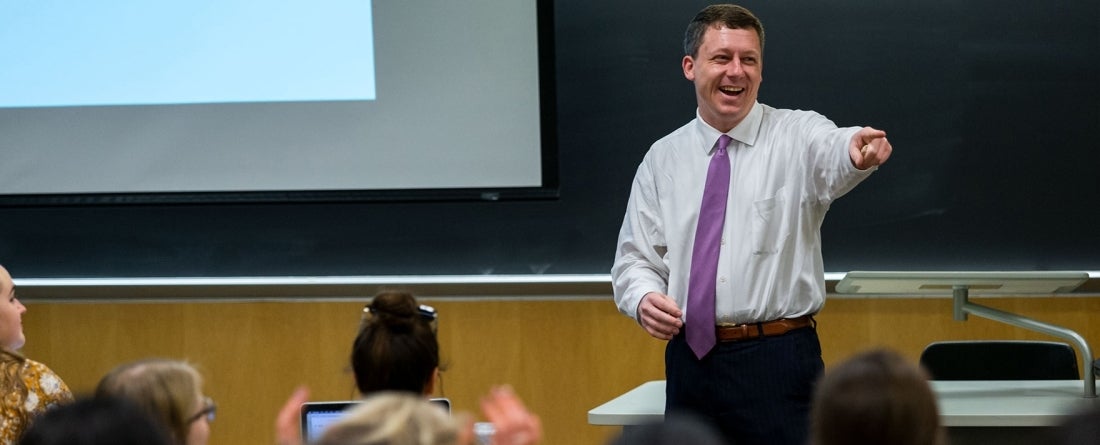
(Photo by John T. Consoli)
Via Maryland Today / By Liam Farrell
After an afternoon brainstorming potential reasons for the 2015 spike in Baltimore city homicides following decades of decline, UMD students in an introductory public policy class are given a stark choice from their professor: From housing discrimination against African Americans to the opioid epidemic, which problem should be tackled first?
“Government has a limited amount of power and a limited amount of money,” Eric Luedtke told the dozens of students in Tawes Hall. “Policymakers have to look at a list like this and say, ‘Where am I going to put my time and energy?’”
Luedtke knows that challenge better than most. An associate clinical professor at the School of Public Policy for that part of the afternoon, he was back in Annapolis a few hours later for a much different gig: majority leader in the Maryland House of Delegates.
“It’s a little bit of juggling to do it,” he said of the dual roles, which this semester involve teaching at the same time as the General Assembly has its 90-day session to pass a budget and consider hundreds of other proposed bills.
Luedtke isn’t a novice in the classroom. A Terp who earned his bachelor’s degree in government and history in 2002 and his M.Ed. in secondary education in 2004, he spent a decade as a middle school teacher in his native Montgomery County. He decided to run for the House of Delegates after seeing his students and their families struggle to make ends meet in one of the wealthiest parts of the country.
Elected in 2010 to represent the district including Olney and Damascus, Luedtke became majority leader in 2019, taking over a key leadership post for the House speaker—first, the late Michael Busch of Annapolis, and now Adrienne Jones of Baltimore County. He also started studying for his public policy doctorate at UMD in 2015.
“There were, frankly, holes in my education,” he said of his decision to go back to school. “I did not have a deep enough background in economics and statistics.”
While his dissertation on why legislators sometimes vote against their political interests (think Republican U.S. Sen. Mitt Romney voting to convict President Donald Trump on abuse of power during the impeachment trial) will be a work in progress for a bit longer, the main lesson he seeks to impart on students is pressing: “They can make a difference.”
The School of Public Policy is proud to have him on the faculty and as a triple Terp, said Dean Robert C. Orr.
"With his own research focused on legislative decision-making processes and how they shape the development of public policy at the state and local level,” Orr said, “Eric brings great insight and experience to an area of education and research we are actively expanding within the school."
Luedtke brings to his class firsthand perspective of the constraints and complications of policymaking—like in the case of Baltimore, believing a single initiative could be a total solution to an endemic problem.
“This isn’t like chemistry,” he told the class. “A lot times, we make public policy based on our best guesses of what’s going on.”
It was a back-to-basics lecture for a Monday-afternoon class just after a grueling week in Annapolis, where a House subcommittee rejected Luedtke’s much-scrutinized proposal to expand the sales tax to professional services for education funding. While still hoping his plan will open the door for other revenue-generating options, he said the classroom always helps to enliven his civic spirit.
“My students are very much idealists,” he said, “and it’s helpful to have my own idealism refreshed.”
